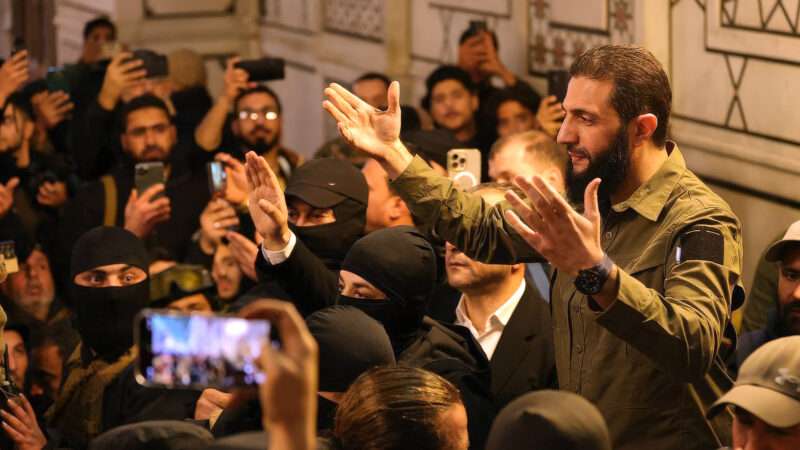
The Assad dynasty has fallen. After 54 years of Assad family rule, Syrian President Bashar al-Assad quietly fled the capital city of Damascus on Saturday night, seeking asylum in Russia. The government that had clung onto power through military force for so long crumbled in the face of a sudden uprising led by Abu Mohammad al-Jolani, former head of Al Qaeda in Syria who later fought against Al Qaeda and founded an independent Islamist organization.
The United States did not expect Assad to fall, but it now has many cards to play in influencing the postwar situation. President Joe Biden gloated on Sunday that his policies have "shifted the balance of power in the Middle East," and promised to keep U.S. troops on the ground in Syria. Although President-elect Donald Trump personally said that Syria is "not our fight," he bashed the Obama administration for not getting involved more decisively. Members of Trump's circle also seem eager to shape the postwar outcome.
"I think Abu Muhammad al-Jolani must be delusional if he thinks that Syrians, having seen the departure of a 54-yr dictatorship yesterday, will sit still as he installs himself as another dictator in Assad's place," wrote Joel Rayburn, a former Trump administration official who is reportedly part of Trump's new National Security Council, in a social media post. Regime change in Syria has been one of Rayburn's pet projects for a long time.
Jolani's forces were not the first to enter Damascus. A motley coalition of local militias with ties to Jordanian and U.S. intelligence beat him to the punch. ("They're very different [from Jolani]. We know a lot of them," a senior Biden administration official told reporters on Sunday.) Still, Jolani is the kingmaker, if not the king. After entering Damascus, he gave a victory speech and installed one of his loyalists as the new prime minister.
Along with its indirect support for rebels, the U.S. military currently has "approximately 900" troops stationed in Syria, some of them stationed alongside Kurdish-led rebels known as the Syrian Democratic Forces, and some of them sitting at a lonely outpost on the Jordanian border known as al-Tanf. Although these forces were originally sent to fight the Islamic State, they have since become a tool for countering Iran and Russia, the Assad government's old backers. In a show of force on Sunday, the U.S. military bombed 75 alleged Islamic State hideouts in areas that used to be under Russian military control.
Turkey, a U.S. treaty ally, and Israel, a close friend that receives extensive U.S. military aid, have joined the fray.
The Israeli army, which had already taken the Golan Heights from Syria in 1967, seized another 155 square miles of Syrian territory along the border. Israeli Prime Minister Benjamin Netanyahu called for the deployment of a "temporary defensive position until a suitable arrangement is found" in an English-language video, but left that phrase out of the Hebrew-language announcement. Israeli fighter jets have also been bombing military equipment across Syria to keep it out of "the hands of extremists."
Turkey, meanwhile, immediately attacked the town of Manbij, near the Turkish border. It was a case of a U.S. ally fighting U.S. proxies. Syrian mercenaries, some of them formerly armed and trained by the CIA, advanced against the Syrian Democratic Forces under Turkish air cover. The Syrian Democratic Forces agreed to withdraw from Manbij after a U.S.-Turkish agreement, a rebel source told Reuters.
"The situation is really bad," Sihem Hemo, a Kurdish official from Manbij, tells Reason by text message. "The people are exposed to torture and pillaging." She says that the Turkish-backed mercenaries began looting after they entered the city and that they have been targeting Kurds as well as former Syrian Democratic Forces fighters.
Aside from its military influence, Washington has one last powerful piece of leverage: economic sanctions. During the war, the United States imposed a trade embargo on Syria and passed the Caesar Civilian Protection Act, designed to prevent international reconstruction as long as Assad remained in power. Jolani's organization, known by its Arabic initials HTS, is also considered a terrorist organization by the United States, the United Nations, and the European Union, which could expose any HTS-led government to more sanctions.
U.N. Special Envoy Geir Pedersen told the Financial Times that there was "no way to exclude" HTS from the future of Syria, and hinted that "those who are dealing with these questions" would be "willing to look at" the terrorism designation if Jolani installs an "inclusive" government. A U.S. official also told reporters that Jolani's organization "will be an important component" of Syria and "we will intend to engage with them appropriately and with U.S. interests in mind."
How the U.S. actually uses its leverage, of course, is the million dollar question. Biden said in his speech that he wants to see a region "where our friends are safe, where our enemies are contained" and a Syrian government with a "commitment to the rights of all Syrians, the rule of law, the protection of religious and ethnic minorities." They're noble goals for sure, but the United States has an awful track record of balancing them, including in Syria itself.
It's hard to see, for example, how to square Biden's vision for an "independent, sovereign" Syria with the fact that two U.S. partners are currently nibbling away at Syrian territory.
Trump's instincts, then, might not be so bad: "THE UNITED STATES SHOULD HAVE NOTHING TO DO WITH IT. THIS IS NOT OUR FIGHT. LET IT PLAY OUT. DO NOT GET INVOLVED!"
The post What's Left For the U.S. To Do in Syria? appeared first on Reason.com.







